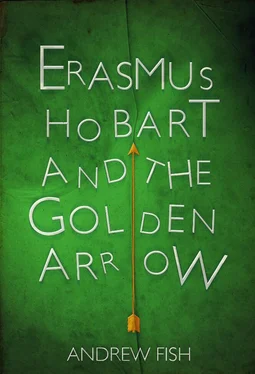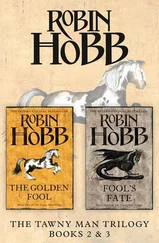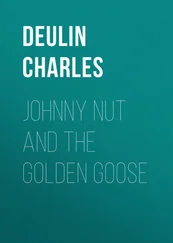Ellen looked at him, but said nothing. She seemed to be waiting for something.
‘Oh,’ said Erasmus. ‘It’s Erasmus.’
‘Your name?’ Ellen wasn’t sure if he wasn’t referring to something else – the species of mould on the lintel, for example. He was clearly a very distracted man.
‘Yes.’
‘It’s an unusual name. Nice.’
‘Thanks. I had unusual parents. At least I presume so – I’ve not made a study. Not my area – psychology.’
‘No? What is?’
‘Physics. And history. Yes, physics and history.’
‘That should make you the best person to work out how to get an ancient weapon into a confined space, then, shouldn’t it?’
‘I suppose it should, yes,’ said Erasmus, taking the statement entirely at face value. ‘I think it might be easier if you go,’ he added on reflection.
‘I’m sorry?’
‘If you’re coming through the door. I’ll have more room to turn the bow.’
‘Ah, yes. I suppose I ought to be getting to my classroom anyway. Do you know where they teach geography, by any chance?’
Erasmus frowned. ‘Have you tried asking a geography teacher?’ he asked. ‘I understood there’s a new one starting today.’
‘Yes, I’d heard that. And I suppose if you want to ask someone directions, a geography teacher would be your best bet.’ Ellen moved out of the doorway and stood aside to let Erasmus pass. The teacher looked intently at bow and doorway a moment, then executed a complex twisting motion and slipped the bow into the corridor. Ellen observed the almost childlike smile of triumph on his face as he succeeded. There was a lot for a woman to like in that smile.
‘I’ll be off then,’ she said, her tone hopeful.
‘OK,’ said Erasmus, studiously pushing his briefcase against the door to hold it in place whilst he manoeuvred the bow. ‘Good luck finding your geography teacher.’
Ellen watched him disappearing into the building. Her face would have made an interesting study had there been a psychology teacher to observe it. Perhaps fortunately, psychology had no place on the curriculum.
The classroom was a dark one; the north-facing windows, set just below ceiling height, allowed little natural light to penetrate and a number of electric strip lights struggled bravely to illuminate the dark and cobwebby corners. For Erasmus, however, this was a home away from home. Without the intrusion of sunlight, there was no difference from one season to another, no time except that which he marked with the staccato sound of chalk on blackboard and no distractions to draw the pupils’ attentions away from their studies.
This was a room in which a teacher could set the class an essay question then sit and peacefully while away the hours with a mug of coffee and a pile of books to mark. He had to use a different room for science lessons, of course: the school wasn’t so well equipped as to allow the laboratories to be tied up with his history lessons, but science lessons tended to be in the afternoons when most of the youthful energies had been expended on the playing field, and the pupils always seemed more docile when they were armed with a piece of Veroboard and a power-pack. True, it was probably because they were working out how to electrify Harrison’s pencil case whilst he was out of the room on one of his frequent trips to the lavatory, but Erasmus firmly believed a few electrical shocks were acceptable in the pursuit of knowledge.
For the moment, however, the room was devoid of pupils as Erasmus kept himself occupied working through a series of torturously complex equations on his blackboard. Soon the nine o’clock bell would ring, signifying the end of registration and the beginning of the slow exodus to the first lesson of the morning.
Turning briefly from his calculations, he glanced at the pile of books on his desk; form 3A first this morning – hopefully Atkinson wouldn’t make too much of a fuss about his bow. He looked at the weapon, propped up next to his umbrella in the corner of the room. Where the boy had acquired such an article was a mystery – he hadn’t seen anywhere selling them and Mr Gaunt certainly wouldn’t have got the pupils to make one in woodwork. He shrugged: small boys seemed to have a natural ability to locate destructive implements, no matter how hard they were to acquire. If the UN had had the foresight to send a squad of thirteen-year-old boys into countries suspected of harbouring weapons of mass destruction, you could guarantee they’d locate any nuclear arsenal in a matter of hours. True, they’d probably set off a few bombs just to see what they could do, but at least you’d know where they were and could take the appropriate action.
The sound of youthful conversation drifted through the door and returned the teacher’s attention to the real world. Erasmus checked his watch: it was three minutes past nine – obviously the tannoy still wasn’t working. He checked the volume control on the wall-mounted speaker: it wouldn’t surprise him to find that a pupil had adjusted it – he’d heard Mr Alesage complain they’d put his clock forward in order to get out of double French early. Erasmus glanced at the clock over the board, but not with any particular interest: unlike Mr Alesage, he never relied on school equipment – experience had taught him to wear a watch to work instead.
Hearing the conversation outside was getting louder, Erasmus put down his chalk and began to wind the crank which turned the blackboards on their rollers and gave him a clean surface on which to write. A loud thump outside the door disturbed him and, realising he couldn’t put the moment off any longer, he strode to the door and opened it.
‘What was that noise?’ he demanded of the straggle of boys who were lined along the wall.
‘It wasn’t me, sir,’ Kirkby protested.
‘I asked what the noise was, not who wasn’t responsible. Have you got a guilty conscience or have you just neglected to wash your ears out this morning?’
Kirkby didn’t answer – he couldn’t see what the right answer was.
‘Well?’ Erasmus directed his gaze over the whole class.
‘Please, sir.’ Harrison’s unbroken voice rang out like the song of a lark that had just undergone an intensive interrogation.
‘Yes, Harrison,’ Erasmus prompted.
‘It was my sandwiches, sir.’
‘Your sandwiches? What have you got in them – gunpowder?’
‘No, sir,’ Harrison objected. ‘Barnstaple threw them at the door.’
There was a chorus of ‘sneak’ from the back of the queue. Erasmus took a discreet look and noted Barnstaple and his usual bunch of cronies. He felt sorry for Harrison: he admired the child’s sense of duty and fair play, but sometimes he felt it would be better if the boy just kept his mouth shut. He looked down at his feet and found a small packet of sandwiches, so tightly wrapped in cling-film you felt that Harrison’s mother was trying to suffocate the contents and make sure they were dead. He motioned to the boy at the front of the queue, who obediently bent down, picked up the package and passed it to the master.
Erasmus looked sternly at Barnstaple. ‘Why did you throw this?’ he asked.
Barnstaple maintained a sullen silence.
‘We’ll stand here until someone tells me,’ Erasmus informed them, ‘and you know what that means, don’t you?’
Some of the smaller boys nodded. Erasmus’ system of punishment basically involved adding up the minutes for which his lesson was disrupted and claiming the time back in a detention. It wasn’t an entirely fair system, since the whole class were punished for the fault of a handful of troublemakers but, as Erasmus himself pointed out, his detentions weren’t about punishing people, but about making sure they came out of school with the right amount of education. British education might be going to the dogs, but there was no way this teacher was going to turn his school into just another kennel.
Читать дальше











